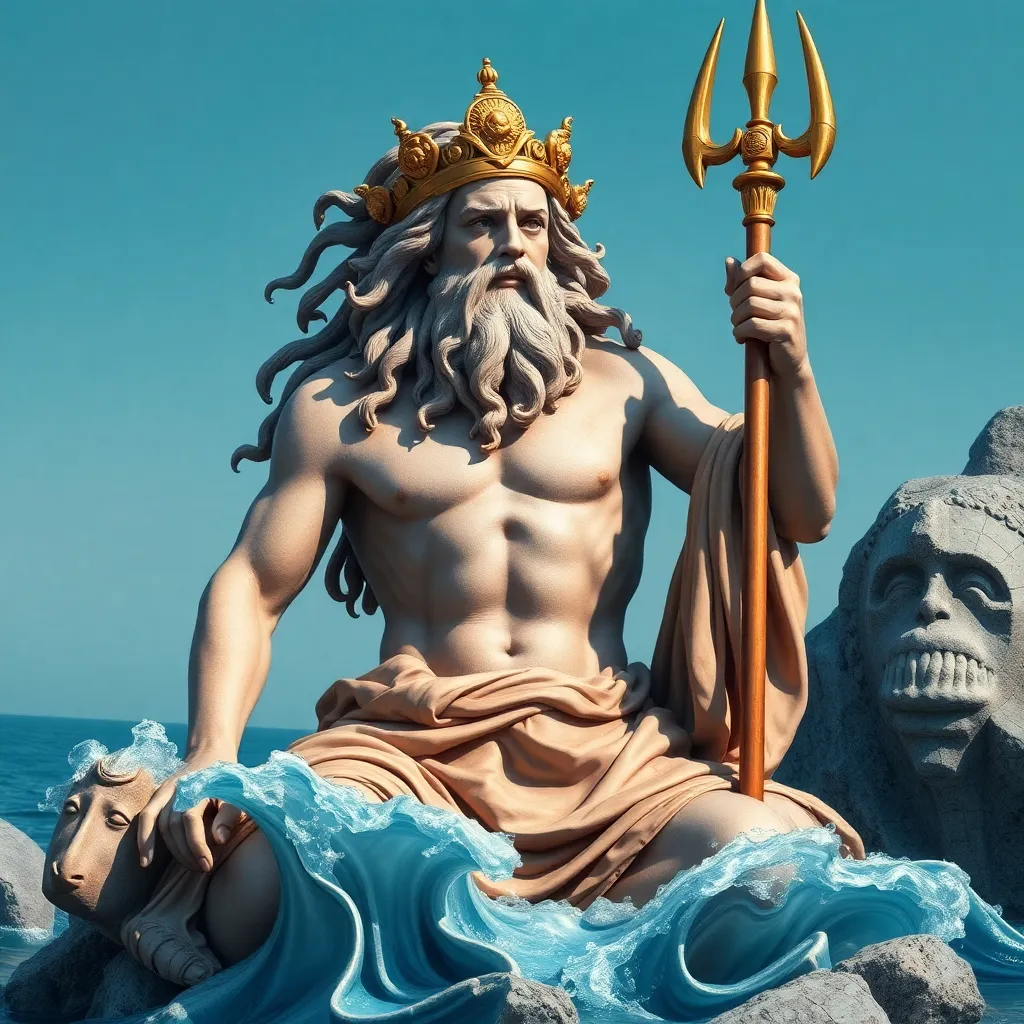The Role of Poseidon in Greek Tragedy and Comedy
I. Introduction
Poseidon, one of the most powerful gods in Greek mythology, is revered as the deity of the sea, earthquakes, and horses. His influence extends beyond the ocean depths, permeating various aspects of ancient Greek culture, including literature, art, and religion. This article explores the complex role of Poseidon in Greek tragedy and comedy, highlighting his significance in shaping dramatic narratives and comedic tales.
II. Poseidon’s Characterization in Greek Mythology
Poseidon is often characterized by his strong and tempestuous nature. He wields a trident, a symbol of his dominion over the seas, and is frequently depicted as a bearded man, embodying the power and unpredictability of water. Key attributes of Poseidon include:
- God of the Sea: He is the ruler of oceans and seas, controlling storms and calming waters.
- Earthshaker: His power extends to causing earthquakes, earning him the title “Earthshaker.”
- God of Horses: Poseidon is also associated with horses, having created the first horse and often depicted riding one.
When compared to other Olympian gods, Poseidon stands out for his dual nature—both nurturing and destructive. Unlike Zeus, who represents order and justice, Poseidon embodies chaos and passion, making him an intriguing figure in literature.
III. Poseidon in Greek Tragedy
In Greek tragedy, Poseidon’s character often serves as a catalyst for conflict and a representation of divine power. He appears in several significant works, such as:
- “The Iliad”: Poseidon plays a crucial role in the Trojan War, intervening in battles and influencing mortal fates.
- “Orestes”: His presence is felt in the themes of vengeance and retribution, showcasing the darker aspects of his character.
Key themes in tragedies involving Poseidon include:
- Power: His authority over the seas often reflects the struggles for control seen in human conflicts.
- Revenge: Poseidon’s wrath can be devastating, symbolizing the consequences of anger and betrayal.
One notable tragic scene involving Poseidon is in “The Iliad,” where he secretly aids the Greeks against the Trojans, revealing his personal vendetta against the latter. This act of interference not only drives the plot forward but also emphasizes Poseidon’s volatile nature.
IV. Poseidon in Greek Comedy
In contrast to his tragic portrayals, Poseidon also finds a place in Greek comedy, where his character is often exaggerated for humorous effect. Notable works by playwright Aristophanes, such as “The Clouds,” feature Poseidon as a figure of satire and absurdity. Themes explored in comedic narratives include:
- Satire: Poseidon’s interactions with other gods and mortals often highlight the follies of human behavior and divine capriciousness.
- Absurdity: The god’s larger-than-life persona lends itself to ridiculous scenarios that challenge societal norms.
Poseidon’s comedic interactions with mortals can be seen in various plays where he is portrayed as both a source of wisdom and folly, often leading to humorous misunderstandings and situations.
V. The Duality of Poseidon’s Role
The contrasting portrayals of Poseidon in tragedy and comedy illustrate the duality of his character. In tragedy, he embodies the darker aspects of power and revenge, while in comedy, he represents the absurdity of life and the folly of man. This duality allows for a deeper exploration of:
- Human Emotions: Poseidon reflects a range of emotions, from rage to humor, mirroring the complexities of human nature.
- Societal Issues: His character serves as a lens through which societal norms and values can be critiqued and examined.
Understanding this duality is crucial for interpreting the broader themes present in Greek mythology and literature.
VI. Audience Perception and Cultural Impact
Poseidon’s role in shaping Greek cultural identity cannot be understated. His presence in both tragic and comedic contexts reveals the multifaceted nature of human experience. Audience reactions to Poseidon vary significantly based on the genre:
- Tragedy: Viewers often experience awe and fear in response to his power.
- Comedy: The audience reacts with laughter and amusement, enjoying the ridiculousness of his antics.
The lasting influence of Poseidon on later literature and art is evident in numerous adaptations and interpretations that continue to resonate in modern culture.
VII. Modern Interpretations and Adaptations
Poseidon’s legacy persists in contemporary theater and film, where he is frequently reimagined in various narratives. Modern interpretations explore his character in diverse ways, often reflecting current societal issues:
- Environmental Themes: Poseidon is sometimes portrayed as a guardian of the oceans, highlighting contemporary concerns about climate change and marine conservation.
- Character Complexity: Modern narratives often delve into his motivations, presenting him as a more relatable figure.
The relevance of Poseidon’s character today underscores the timeless nature of mythological themes, connecting ancient stories to contemporary human experiences.
VIII. Conclusion
In summary, Poseidon’s significance in Greek tragedy and comedy showcases the complexity of his character, reflecting human emotions and societal issues. His dual role as a powerful god and a comedic figure enriches the narratives of Greek mythology, demonstrating the enduring nature of these themes throughout history. As we continue to explore and reinterpret Poseidon’s character, we gain insight into the human experience and the timeless relevance of mythology in our lives.




